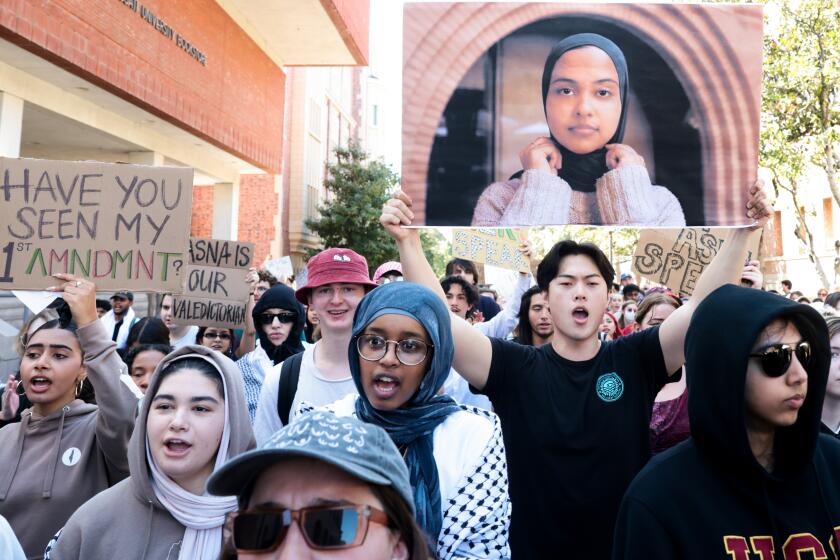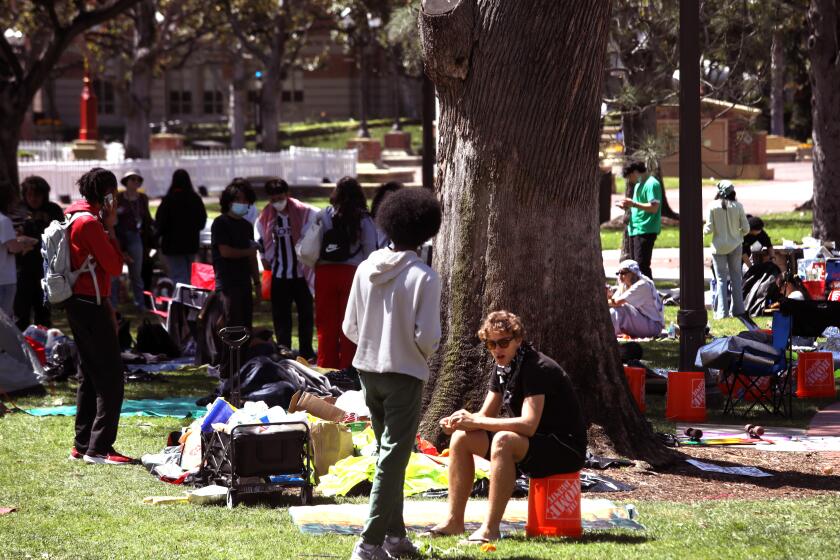Making it legal
Scrawled across the corner of her bathroom mirror are the words entrepreneur Sheri Varela tries to live by: “Do what you love.”
That message helped inspire her to launch a T-shirt business last month that sells tops for women decorated with messages such as “Breathe” and “Attitude Matters.”
Money has been tight for the home-based business, Sheri Baby Inc. So when Varela heard about a free legal service for small businesses offered by USC, she snapped up a spot.
“I needed to get some assistance so I could protect my company as best as possible,” said the Valencia resident, a former mortgage broker and onetime teacher.
In the spring, the USC Small Business Clinic helped Varela set up her online business, Sheribaby.com, as an S-corporation. She paid only the filing fees charged by the state.
“A lot of the work we do could easily cost $5,000 to $10,000 in a law firm,” said Michael Chasalow, director of the year-old clinic and a visiting clinical assistant professor at the USC Gould School of Law.
The on-campus clinic offers basic corporate legal services to small businesses, including setting up limited-liability corporations and other entities.
The law students who compete to staff the clinic’s nine positions also have drafted a promissory note, shareholder agreements and terms and conditions wording for websites. They’ve created simple licensing agreements and can review leases, among other contracts.
What they don’t do is get involved in formal negotiations with an opposing party.
“I’m not looking to start a law firm,” said Chasalow, who is also a principal at Onondaga Inc., a small private equity group for start-up and early-stage companies.
“We are looking to create an experience to benefit the student and client, and there are plenty of people we can benefit even sticking to the things we are really good at,” he said.
The program is among a number of law school clinics nationwide offering free or low-cost legal help for small businesses.
While other clinics, such as one at Columbia University in New York, tend to focus on helping small businesses in poverty-stricken neighborhoods, the USC clinic has a broader focus, he said.
Chasalow targets Southern California small businesses but draws the line at helping wealthy firms.
Chocolate seller LaTonja Simpson didn’t have to worry about qualifying. She and her sister, Nicole Meteer, have relied on their own funds and online auctions to find used equipment for the Chocolate Bar, a high-end shop they hope to open somewhere between Encino and Studio City this fall.
“We didn’t have a lot of money,” the former Amgen Inc. project manager said.
The sisters plan to buy French and Belgian chocolates to sell at their retail shop, which is modeled after a shop another sister owned until recently in Alabama.
Simpson, who is working with the law clinic to incorporate the business, has done extensive research to back up her hunch that Angelenos have an underserved craving for the rich, dark chocolate that is touted for its health-boosting properties.
She is among 70 clients the clinic has served since it launched last September. Some have been student-run businesses. A handful have been nonprofits.
Businesses and nonprofits can apply online at law.usc.edu /academics/clinical/sbc.cfm.
Once accepted, new clients meet for 90 minutes with a law student and Chasalow. Follow-up, handled by the student, typically happens via telephone and e-mail. Chasalow reviews all student work.
Kathy Macaraeg contacted the clinic in May. She assumed she would need help to form a limited-liability corporation for her Culver City senior-transportation and errand company, TLC Senior Helpers Inc. Instead, the clinic recommended she incorporate the soon-to-be-launched business to help protect her against the potential liability involved.
And the price was right.
“It was such a help to go to them and not spend funds on a law firm, especially when you have limited start-up funds,” said Macaraeg, a former public relations consultant.
She was inspired to start her business when she saw two seniors in Westchester arguing over a cab that had taken more than an hour to arrive.
Macaraeg plans to buy her own van and hire drivers. Her research shows that her $25 hourly rate is almost half that charged by competitors. Group transportation will be $20 an hour, she said. She appreciated the help of clinic staffers, including third-year law student Marlayne Ingram.
Ingram, who worked full-time at the clinic this summer with two other students, said she was happy to have the chance for the substantive work, extensive client contact and management of multiple projects, all overseen by a seasoned attorney.
She’s already signed on for a yearlong stint starting this fall. She’ll help more small-business owners set up their companies’ legal structures, including writing up Securities and Exchange Commission documents and drafting shareholder agreements, among other work.
It’s the kind of hands-on work students crave. “I’ve learned how to serve a living, breathing client,” Ingram said. “I feel like it’s made me a better student and a better person.”
Chasalow, who has a waiting list of clients and students, says the clinic provides an outlet for students who don’t usually have a chance to do legal-oriented community service, such as those studying for careers in corporate law.
For T-shirt maven Varela, now that her company is organized, she’s ready to get serious about selling her favorite article of clothing. The California native used to turn her own T-shirts inside out so she could write inspirational messages on them. It worked for her. Now she hopes the positive message will help her attract the masses to her website.
Says Varela: “I’m going to need another T-shirt for myself to get through that one.”
--






